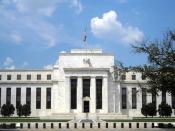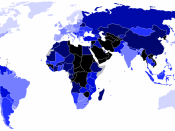Laissez fair is described as being an economic philosophy that opposes governmental regulation of or interference in commerce beyond the minimum necessary for a free-enterprise system to operate according to its own economic laws. People who support a laissez fair system are against minimum wage, duties, and any other trade restrictions (Doc. A). Laissez fair derived most of its popular support from the idea that in America, unlike ÃÂOld WorldÃÂ countries, opportunity for economic advancement was open to all, and the degree of an individualÃÂs achievement depended primarily upon his own character, talents, and efforts. However, when examining the corruption that occurred within land grants, interstate commerce, and anti-trust activities, government intervention was inevitable, and therefore in violation of the ÃÂnatural lawÃÂ and the principles of laissez fair.
The sort of behavior that was encouraged and rewarded by the existing economic system was ruthless and selfish competitiveness. Although people would compare the past in a favorable manner to the present, (1860s-1900s), they did not wish to forego the economic and technological progress.
On the contrary, they were excited by its potential social benefits. It was increasing the wealth of America! However, this wealth was distributed so unequally. (Doc. H)Later, people began to believe that a democratic society could be achieved through the free workings of a competitive system. (Doc. N)Still, large industriesÃÂ power seemed to exempt them from discipline of the market and leave them in a position to exploit their suppliers, their customers, and their employees. Their vast capital resources and ability to sustain temporary losses enabled them to keep new competition from the playing field. There was a simple fear of the power of money within politics. (Doc. G)Trusts were artificial creations, maintained through essentially unfair competitive methods by those with privileged access to capital and legal protection.


